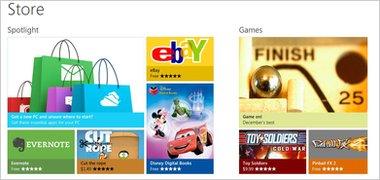Microsoft reveals details of its Windows Store plan
- Published

Microsoft's Windows Store is set to launch in February 2012
Details of the Windows Store have been released by Microsoft.
The service will allow users to buy applications online for Windows 8-based PCs, desktops, laptops and tablets when the system launches next year.
Microsoft is offering best-selling developers a bigger share of sales than rivals' stores. Users will also be able to use some apps on a trial basis.
Experts say the move hastens the death of boxed software sold via retailers.
Traditionally most software has been purchased from High Street stores or downloaded directly from developers' websites.
However, Valve's Steam videogames service, Apple's App Store, Google's Android Market and the Blackberry App World have helped create a shift towards one-stop software stores.
Microsoft already runs a Windows Phone Marketplace where it sells third-party software.
In February 2012 it will extend that model to other devices to coincide with the beta release of the next version of its operating software.
Microsoft says the store will be global, enabling developers to sell their apps in 231 markets and in more than 100 languages.
Sales split
Developers can offer their software for free, but otherwise the minimum price is $1.49 (95p), which is higher than the 99 cents minimum found on most other stores.
The firm also distinguishes itself by offering software writers 80% of the revenue from app sales and in-app purchases using its payment process, if their app earns more than $25,000.
Below that threshold it offers the same 70% split offered by Apple and Google.
Microsoft will also allow developers to use their own transaction platforms for in-app sales, helping them keep track of subscribers. The software firm will not take a share of earnings if this is the case.
By comparison Apple insists all in-app purchases should go through its systems and it will not share information on its subscribers unless they give their permission.
This has frustrated many newspaper and magazine publishers and led to the Financial Times' mobile app being dropped from Apple's store.
'Predictable'
Microsoft also boasts of a "transparent approval process".
"We want to increase predictability and eliminate any capriciousness in app certification," Ted Dworkin, partner program manager for the storewrote in a blog, external.

Microsoft will allow newspapers to operate their own in-app subscription payment systems
Microsoft promises to publish a set of clear, updated policies and is offering software to help developers see how far their app has progressed along its approval process.
Apple has been criticised for not always being clear about its decisions, despitehaving published guidelines, externalin October last year.
Google, by contrast,allows any submitted app, externalto be published, and then removes software if users complain that it is malicious or it otherwise breaches the firm's terms and conditions. Analysts say this laissez-faire approach has allowed poor quality apps to get through.
Ultrabooks
Microsoft says its platform will also support time-based and feature-based trials allowing customers to try out software before committing to an in-app purchase without the need to reload a separate version of the code.
Analysts say the move is timely bearing in mind the growing popularity of ultrabooks - portable laptops that do not have built in CD/DVD-drives.
"The death knell for boxed software was sounded some time ago but this is another nail in the coffin," said Patrick O'Brien, principal analyst at Verdict Research.
"Software is increasingly being downloaded over the internet instead of via CD-Roms. But in this particular case it will be particularly useful in drawing consumers who want the reassurance of a big name like Microsoft and might have felt uncomfortable handing their credit card details to a small third party developer."
- Published8 March 2012
- Published15 September 2011
- Published26 August 2011